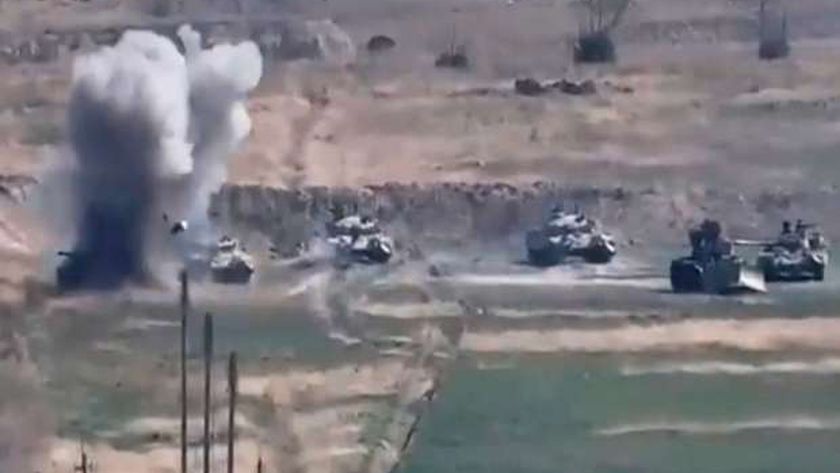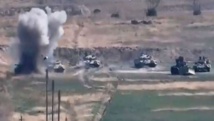"Intense fighting continues along the entire battle line," Armenian Defence Ministry spokesperson Shushan Stepanyan said in a statement.
Azerbaijan reported that Armenian forces had attacked the city of Tartar, which lies near the disputed Nagorno-Karabakh zone, with "heavy artillery shelling," state media reported.
With a death toll believed to have surpassed 100, including several civilians, it is the bloodiest fighting between the two sides since a similar flare-up in 2016.
The fighting has raised concerns that the flare-up could escalate into an all-out war, as the combatants look to regional powers Turkey and Russia for support.
Impoverished Armenia has traditionally relied heavily on backing from Russia, with which it has a shared Christian heritage. Oil-rich Azerbaijan is supported by predominantly Muslim Turkey, thanks to close ties between their ethnic Turkic populations.
Turkey said on Wednesday that it would back Azerbaijan with "every means available," according to comments by Turkish Foreign Minister Mevlut Cavusoglu published by Turkish state news agency Anadolu.
"We will do what is necessary ... if Azerbaijan wants to resolve this on the field," Cavusoglu said after being asked whether Turkey would provide military support to Azerbaijan.
Armenia has already accused Turkey of direct involvement in the conflict, saying that a Turkish F-16 fighter jet shot down an Armenian warplane earlier this week, killing the pilot. Turkey has denied the allegations.
Russia on Wednesday criticized Turkey's pledged support to Azerbaijan and the belligerent rhetoric of senior Turkish officials, with the Kremlin saying: "One should not pour fuel onto the fire."
Russia maintains close military ties with Armenia, including a military base, and has repeatedly called for an immediate ceasefire after the flare-up erupted on Sunday.
After holding phone calls with his counterparts in Yerevan and Baku, Russian Foreign Minister Sergei Lavrov reiterated this position, and also confirmed that Moscow was ready to mediate in the conflict.
Armenian Prime Minister Nikol Pashinyan said meanwhile, in comments carried by Armenian state news agency Armenpress, that Armenia does "not need yet to use the potential of the Russian base, however, in case of necessity, all legal grounds exist."
Azerbaijan's president, Ilham Aliyev, vowed that his country would continue military operations until Armenia withdraws from the area and said that calls for dialogue were thus pointless.
The European Union earlier this week expressed concern about the potential for a war.
"We urge everyone to do all they can to prevent an all-out war from breaking out," EU foreign affairs spokesperson Peter Stano told a press briefing, explaining that EU officials had contacted diplomats from both sides in the conflict.
French President Emmanuel Macron has blamed Azerbaijan for the recent flare-up, saying it has been "established" that "the shots came from Azerbaijan."
Macron said he had no proof of Turkish involvement in the conflict. But he criticized Turkey for issuing "warlike messages which, in the end, remove Azerbaijan's inhibitions about a possible reconquest of Nagorno-Karabakh," saying that France "will not accept that."
The European Court of Human Rights has instructed Armenia and Azerbaijan to avoid any military action that could put the life and health of civilians at risk, it said on Wednesday.
The Strasbourg-based court said it considered the current fighting over Nagorno-Karabakh to pose a risk of serious violations of the European Convention on Human Rights, to which both states are parties.
Azerbaijan reported that Armenian forces had attacked the city of Tartar, which lies near the disputed Nagorno-Karabakh zone, with "heavy artillery shelling," state media reported.
With a death toll believed to have surpassed 100, including several civilians, it is the bloodiest fighting between the two sides since a similar flare-up in 2016.
The fighting has raised concerns that the flare-up could escalate into an all-out war, as the combatants look to regional powers Turkey and Russia for support.
Impoverished Armenia has traditionally relied heavily on backing from Russia, with which it has a shared Christian heritage. Oil-rich Azerbaijan is supported by predominantly Muslim Turkey, thanks to close ties between their ethnic Turkic populations.
Turkey said on Wednesday that it would back Azerbaijan with "every means available," according to comments by Turkish Foreign Minister Mevlut Cavusoglu published by Turkish state news agency Anadolu.
"We will do what is necessary ... if Azerbaijan wants to resolve this on the field," Cavusoglu said after being asked whether Turkey would provide military support to Azerbaijan.
Armenia has already accused Turkey of direct involvement in the conflict, saying that a Turkish F-16 fighter jet shot down an Armenian warplane earlier this week, killing the pilot. Turkey has denied the allegations.
Russia on Wednesday criticized Turkey's pledged support to Azerbaijan and the belligerent rhetoric of senior Turkish officials, with the Kremlin saying: "One should not pour fuel onto the fire."
Russia maintains close military ties with Armenia, including a military base, and has repeatedly called for an immediate ceasefire after the flare-up erupted on Sunday.
After holding phone calls with his counterparts in Yerevan and Baku, Russian Foreign Minister Sergei Lavrov reiterated this position, and also confirmed that Moscow was ready to mediate in the conflict.
Armenian Prime Minister Nikol Pashinyan said meanwhile, in comments carried by Armenian state news agency Armenpress, that Armenia does "not need yet to use the potential of the Russian base, however, in case of necessity, all legal grounds exist."
Azerbaijan's president, Ilham Aliyev, vowed that his country would continue military operations until Armenia withdraws from the area and said that calls for dialogue were thus pointless.
The European Union earlier this week expressed concern about the potential for a war.
"We urge everyone to do all they can to prevent an all-out war from breaking out," EU foreign affairs spokesperson Peter Stano told a press briefing, explaining that EU officials had contacted diplomats from both sides in the conflict.
French President Emmanuel Macron has blamed Azerbaijan for the recent flare-up, saying it has been "established" that "the shots came from Azerbaijan."
Macron said he had no proof of Turkish involvement in the conflict. But he criticized Turkey for issuing "warlike messages which, in the end, remove Azerbaijan's inhibitions about a possible reconquest of Nagorno-Karabakh," saying that France "will not accept that."
The European Court of Human Rights has instructed Armenia and Azerbaijan to avoid any military action that could put the life and health of civilians at risk, it said on Wednesday.
The Strasbourg-based court said it considered the current fighting over Nagorno-Karabakh to pose a risk of serious violations of the European Convention on Human Rights, to which both states are parties.









 Home
Home Politics
Politics











